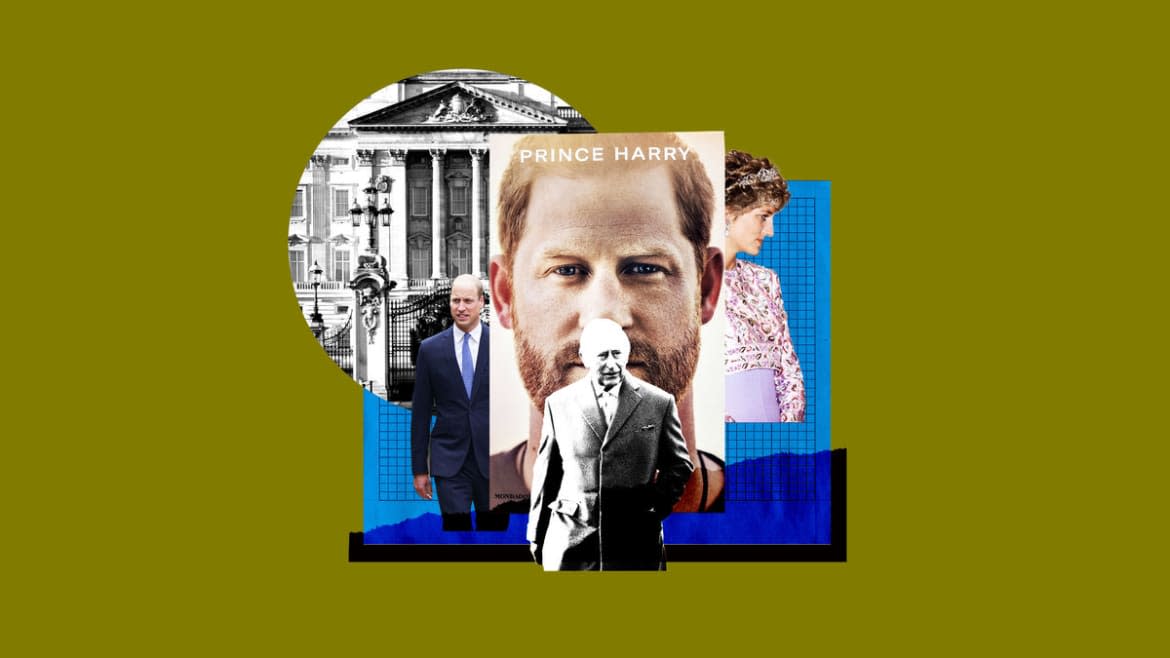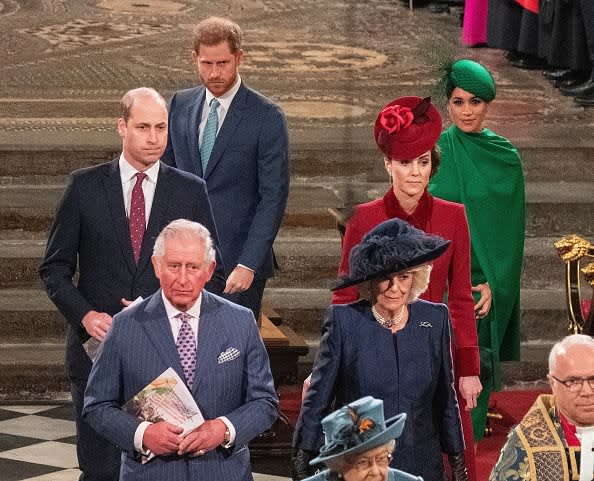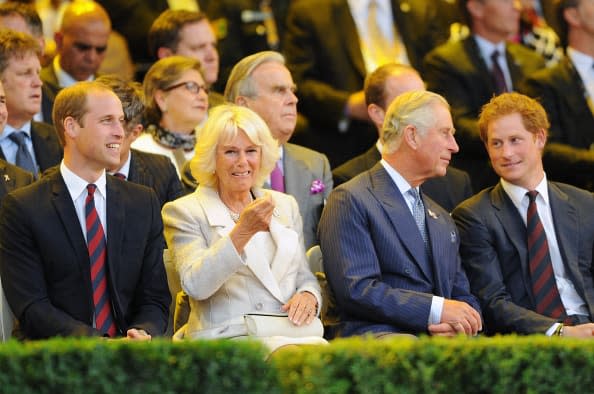Prince Harry’s Memoir Is Truly Devastating for the Royal Family

Royalist is The Daily Beast’s newsletter for all things royal and Royal Family. Subscribe here to get it in your inbox every Sunday.
In the course of just one week since its publication, Prince Harry’s memoir Spare has destroyed decades of manipulation by Buckingham Palace to control the public image of the royal family.
Although the book contains no history-changing revelations, it serves up such rich anecdotal detail on life inside one of the world’s strangest families that the royal brand will never be the same again.
In delivering this devastating blow, Harry continues a mission launched by his mother, Princess Diana, in 1992, when she covertly collaborated with Andrew Morton on his book, Diana: Her True Story. That gut-wrenching account of her failing marriage with Prince Charles stripped away the royal rule that, no matter what pain was being suffered in private, the public face of all the royals should maintain a dignified inscrutability, as though pain was something only commoners could discuss—or even feel.
All Prince Harry’s Memoir Revelations ‘Spare’ No One, Including Himself
Thirty years on, the basic pathology remains the same. As do many of the villains. But the consequences for the monarchy are much graver, because Diana’s principal villain, Prince Charles, is now King Charles III.
Charles is the most defamed of the royals in Spare, and the book highlights the character traits that bear on Charles’s capacity to be an effective monarch. First of those, his inability to connect to people, is shown through his failures as a father, beginning with the harrowing scene where he tells Harry of Diana’s death and cannot manage a hug. Then there is the vanity that resents being outshone by those more naturally able to effectively connect with the public—first Diana, and then Prince William and Kate Middleton and, of course, Harry and Meghan Markle.
Harry shows that he and William did not just lose a mother, they lost a father, and they lost him before they lost her as he became carnally besotted with Camilla. Charles’ misfortune is to come to the throne at a time when connecting with his subjects has never been more essential. Between now and the coronation in early May, his every appearance will be scrutinized for qualities of leadership in a Britain where the political leadership has been abysmal, with three prime ministers in one year.
Indications are that a conventional royal cavalcade will be staged: tours of the Commonwealth by the king and by the Waleses (hopefully better briefed than they were in the Caribbean) and a state visit to France, where Charles is more likely to be seen as the king of Brexit Britain, that annoyingly obtuse offshore island, rather than of a coherent kingdom. As for the coronation, given that millions of his subjects are living in desperate straits, the danger is that this will look like staging a banquet next to a food bank.
As it is, the palace’s response to Spare is to stay in the bunker and pretend that the book is of no consequence, and to continue to depend on the idea that, in the end, they can retain control of the narrative as they always have by their normal methods (which include what Harry calls “the press and the sick relationship that’s evolved between it and the palace.”)
A report in the London Sunday Times quoted somebody “who has the king’s ear and who knows the Sussexes well” saying that a reconciliation between two sides was still possible. “Both sides need to hold their hands up and admit we didn’t get everything right.”
A family insider told me: “Silence is the only course open to them, and it has been effective so far, in that now, at last, at least over here, the story is subsiding. The king is genuinely fond of his son, and wishes to keep the door open for him. By not responding he does not fuel the argument.”
It may look that way from London, but not elsewhere.
Here, for example, is Rebecca Mead, the London correspondent of The New Yorker, in her review of the book: “Spare is an unprecedented exposure of the Royal Family from the most deeply embedded of informants. The Prince in exile does not hesitate to detail the pettiness, the vanity, and the inglorious urge toward self-preservation of those who are now the monarchy’s highest-ranking representatives.”
And Helen Lewis in The Atlantic: “…this book still holds extraordinary power, not least as the best case yet against a hereditary monarchy.”
Or, more seriously because it comes from Australia, where moves to remove the British monarch as head of state are gathering strength, by Jenny Hocking, a leading republican: “The monarchy may rue the day it failed to recognize a rare opportunity for it to evolve, to embrace the contemporary reality of the post-imperial Commonwealth… this unedifying display of royal family discord will only hasten Australia’s move towards a republic.”

Britain's Prince William, Duke of Cambridge (L), Britain's Prince Charles, Prince of Wales (2nd L), Britain's Prince Harry, Duke of Sussex (3rd L), Britain's Camilla, Duchess of Cornwall (3rd R), Britain's Catherine, Duchess of Cambridge (2nd R) and Britain's Meghan, Duchess of Sussex (R) depart Westminster Abbey after attending the annual Commonwealth Service in London on March 9, 2020.
So we come to the other target in Harry’s escalating war, the British tabloids. This part of the war will be very costly and hard to win. It involves his wife, Meghan Markle, as much as him.
At the time Meghan won a landmark court case case against the Mail on Sunday for publishing a letter to her father, she declared that “we are now collectively brave enough to reshape a tabloid industry that conditions people to be cruel, and profits from the lies and pain that they create.” She was awarded a token payment of just one pound for invasion of privacy but the newspaper paid a much larger sum, donated to charity, for copyright infringement.
In his latest interview, back in Montecito, with Bryony Gordon of the Daily Telegraph, Harry said it is his “life’s mission” to tackle press abuse: “It took my mum, it took Caroline Flack, who was my girlfriend, and nearly took my wife. And if that isn’t good enough reason to use the pain and turn it into purpose, I don’t know what is.”
The Sussexes’ contention, that some members of the royal family, as well as some of their communications staff, repeatedly protect their own reputations by briefing against them, underpins Harry’s case in Spare; it is presented as a kind of deal with the tabloid devil. This is certainly true—Mead, in The New Yorker, endorses that picture, describing the book as “the most thoroughgoing scything of treacherous royals and their scheming courtiers since the Prince of Denmark’s bloody swath through the halls of Elsinore.”
However, this muddies the picture of how the palace and the British press work together. Stephen Colbert, talking to Harry, made a generalizing point about the “mendacious and corrupt” British press. Britain has some of the world’s best newspapers, and some of the worst. It’s important to distinguish between them.
The tabloids are bottom-feeders. Their newsrooms foster a brutally competitive hunger for scoops, no matter how trivial. Careers are made or lost according to how a reporter scores on the scoop chart. And a carefully planted royal leak can be a valuable prize for an editor in the relentless commerce of celebrity chasing. In this case, the most notorious actors are the Daily Mail, the Mail on Sunday (owned by Lord Rothermere) and Rupert Murdoch’s sui generis The Sun.
But the so-called royal rota, that Harry referred to darkly in his interview with Colbert, is not part of that collusion. Its purpose is to assign coverage of royal events to a few reporters and photographers whose editors agree that, to minimize the numbers, their work will be shared with all media.
The problem with the Sussexes’ case against the British press, particularly evident in Spare, is not that it’s unconvincing but that it’s not forensic enough. There are no dates, names, quotes. Harry complains that the villains leave no fingerprints, but he doesn’t find any. Nor is the book prescriptive.
Sure, the tabloids have been awful and often cruel to Harry and Meghan, and show no sign of letting up now. But the issue for British journalism is that that they are not the only people with a serious complaint about how the Windsors spin their alternative version of events, current or historical. At root, the Windsor theory of a constitutional monarchy is of an institution that doesn’t tolerate either transparency or accountability. Like other features of the court regime, this attitude dates back to a time, the 1950s, when reflexive deference to the monarchy was still observed and press coverage was fawning and anodyne.
Even now, the British press is less than vigilant about the secrets that the Windsors feel they can keep from their subjects. For example, the contents of Prince Philip’s will are sealed for 90 years. And this is particularly true about their money: how much there is, and how they spend it (and how they don’t—they have never been big on philanthropy).
The most persistent and cogent reporting on this subject has not been by a journalist, but by a lawmaker, Norman Baker. In the introduction to his classic book, And What Do You Do?, Baker writes, “You will struggle to find very much in the way of proper journalism that examines the monarchy in the way that their position and influence merit in a mature democracy.”
In the meantime, what do the Sussexes really expect to happen to end the poisonous pact between the royal household and the tabloids? As I said, the book is not prescriptive. The only person who can end this regime is King Charles himself. He is likely to see that as unilateral disarmament: if he tells the tabloids to bugger off and orders the other royals to do the same they will turn on him. And, since the keeping of secrets is a lifelong habit of his, he’s not suddenly going to convert to the idea of opening up the books to public scrutiny or making himself accountable for anything.
Charles has significantly dodged any responsibility for the way his Prince’s Trust has been trading honors for donations—or even explaining how or why he came to personally accept a suitcase containing a million euros in cash, as a donation to a charity, from a former Qatari prime minister.

Prince William, Duke of Cambridge, Camilla, Duchess of Cornwall, Prince Charles, Prince of Wales and Prince Harry attend the Opening Ceremony of the Invictus Games at Olympic Park on September 10, 2014 in London, England.
That said, the Sussexes themselves are not above insisting on a kind of client journalism of their own. When they launched their short-lived Sussex Royal website they set out their rules for collaborating with reporters, who should be from “grassroots media organizations” or involve “young up-and-coming journalists” (as opposed to bibulous old hacks from the tabloids). In other words, they were attempting to establish an alternative journalism on their own terms.
Moreover, Harry & Megan, the overlong Netflix documentary, did not meet the usual documentary standard of allowing contrary viewpoints to their own. This is a weakness in their mission that they would be well advised to address.
In the history of the Windsor monarchy, there are two precursors to Spare: the first was by Marion Crawford, nanny to the infant future Queen Elizabeth and her sister Margaret, known as Crawfie. In 1948 she published her memoir, The Little Princesses, a blockbuster by the standards of the day, after being told by Elizabeth II’s mother, the then-Queen Elizabeth : “I do feel, most definitely, that you should not write and sign articles about the children, as people in positions of confidence with us must be utterly oyster…you must resist the allure of American money.”
As a result, and much to Crawfie’s distress, she was ostracized for the rest of her life by the family, who passed her house on their annual procession to Balmoral without giving it a glance—utterly oyster.
In 1951, the proto-fascist Duke of Windsor published A King’s Story, his memoir, that was as boring and self-serving as he was, after the famously stern courtier Tommy Lascelles had advised King George VI that the duke didn’t care about royal protocols: “Long experience has convinced me that he has no such feelings when the interests of the Monarchy or Royal Family conflict with what he imagines to be the interests of himself and the Duchess.”
As for Harry, who has been assigned by some reviewers an alleged fondness for Shakespeare as a chronicler of murderous royal houses, the relevant reference must surely be from Henry V, the prologue to Act IV, when the king, concealing his rank and identity, tours his soldiers in their camp, severely outnumbered by the French before the battle of Agincourt, to take a measure of their morale. The chorus says, “Thawing cold fear, that mean and gentle all Behold, as may unworthiness define, A little touch of Harry in the night.”
This time, for the king, a little touch of Harry in the night is more than enough to guarantee insomnia.
Get the Daily Beast's biggest scoops and scandals delivered right to your inbox. Sign up now.
Stay informed and gain unlimited access to the Daily Beast's unmatched reporting. Subscribe now.

 Yahoo News
Yahoo News 
